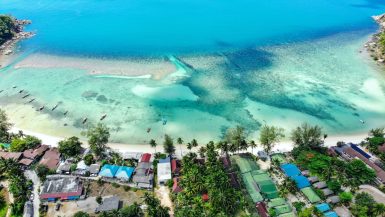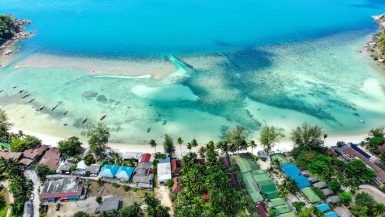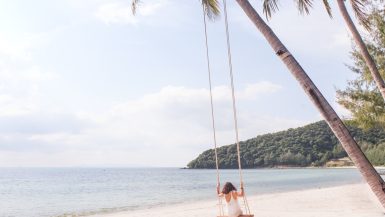
Choosing between Koh Lanta vs Koh Samui is not an easy task. Both are beautiful islands featuring wonderful sights and stunning beaches. Despite being located on opposite sides of mainland Thailand and in two different oceans, these two islands actually have many similarities. But there are some differences that we’ll do our best to lay out for you here.
Luckily any trip to Thailand is a trip to paradise. The food, the diving, the beaches, the lifestyle, you just can’t go wrong with this beautiful, chilled-out country. That being said, different parts of the country have got different vibes, and you want to make sure you pick the right spot for your perfect holiday.
So, before you make your choice take a look at our comparison of the two islands, we hope it helps you make the decision between Koh Lanta and Koh Samui.
Koh Lanta Vs Koh Samui: Transport

We’re starting here because this is a big difference between the two islands. And it’s probably the one which is most helpful in making your decision. Which is easier to get to Koh Lanta or Koh Samui?
Well, the short answer is Koh Samui. You can arrive at Koh Samui by boat from its neighboring islands or the mainland, or you can fly in. This island has an international airport located only 2km from the main resort hub of the island, Chaweng. This makes Koh Samui the easier choice for fly-in-fly-out holidays. Travelers coming from afar will need to change planes in Bangkok, Singapore, or Kuala Lumpur, but it’s an easier arrival than Koh Lanta. And you’ll lose less of your holiday to travel time.
In comparison, Koh Lanta has no airport, so access is by ferries from nearby islands or the mainland. Most people arriving in Lanta come via minibus taxis and boat from Phuket and Krabi – the closest airport 1 ½ hrs away, or via boat from Koh Phi Phi. These routes are well-traveled, regular, and easy to book but are less convenient than flying straight in.
Our Opinion: It depends on your style of traveling and what kind of trip you want. For fly in fly out holidays where you want to get the most out of your time on the Island, Samui is easiest. For holidays where you’re location hopping and slow traveling between islands, Samui and Lanta can both provide that. So…
Winner: for ease of access, it has to be Koh Samui.
Koh Lanta Vs Koh Samui: Sights and Attractions

Both of these islands are small enough that you can easily explore all of their famous sights, hidden coves, and stunning landscapes. And both offer a wealth of sights to get out and visit.
On Samui, you can see meditation temples, giant buddhas, coconut farms, rubber plantations, waterfalls, a secret buddha garden, and even a mummified monk at Wat Khunaram. You can also visit the Hin Ta and Hin Yai (grandfather and grandmother) rock formations at Lamai beach. These rocks, formed like large stone genitals, provide endlessly entertaining for tourists. Once you’ve stopped giggling, take a visit to Bo Phut Fisherman’s village to shop and eat amongst the old traditional shop fronts that now house elegant restaurants and boutiques. Plenty of organized tours are on offer to guide you around the sights of the island in a day.
Koh Lanta has less famous man-made sights but no less beautiful scenery. This reasonably flat island has good roads and limited traffic. So rent a moped (always take a helmet) and explore this beautiful island under your own steam. Hike through jungles to visit waterfalls and limestone caves carved out by monsoon rains. Follow the road as far south as you can to see the Marine National Park headquarters. There you can enjoy the beautiful beach and take a stroll to the little lighthouse. Just watch out for the monkeys. They will run across the road in front of your scooter and try to steal your lunch!
Then head to our favorite part of the island, Ban Ko Lanta or Lanta Old Town on the east coast. Once the haunt of sea gypsies, this old commercial port is now a peaceful little village of traditional wooden houses and shopfronts. Wooden piers stretch out across the water holding quirky restaurants. Enjoy the freshest of seafood here while lounging in a hammock that swings out over the water.
Our Opinion: Koh Samui definitely has a lot more man-made sights and tourist attractions than Lanta. But the experience of cruising through Lanta’s natural beauty on a scooter is fantastic. Plus, Lanta gets extra points for its atmospheric Old Town.
Winner: We’re calling this one a draw.
Koh Lanta Vs Samui: Nightlife

Koh Samui has a reputation for some of the best nightlife in Thailand, and for a good reason. There is something for everyone on this island; beach clubs with DJs and fire dancers, pavement bars with plastic stools and cheap drinks, resort locations with private entry and pool bars, red-light districts with poles, and gogo dancers. And, of course, Koh Samui’s famous Ladyboy Cabaret Shows. Head to Chaweng and Lamai for the most vibrant nightlife scenes. Check out Bo Phut for a more chilled-out bar vibe.
Koh Lanta is definitely more laid back. If you’re looking for an all-out party island, you’ll have to look elsewhere. Lanta is more about hippy hangouts, cocktail buckets, reggae bars, and the occasional mushroom shake for those who fancy it. You’ll find a few livelier nights on offer: DJs playing sunset sessions and live bands strumming the evening away with rock and reggae covers. But you won’t find any big-name beach clubs or cocktail lounges here.
Our Opinion: For beachside beers and sunset views, Koh Lanta’s got you covered, but if you want to party all night in a thriving nightlife district, you’re going to want to head to Samui.
Winner: for sheer variety and abundance, it has to be Koh Samui.
Koh Lanta Vs Samui: Beaches

You just can’t go wrong with beaches in Thailand, and neither of these islands will let you down. Both offer beaches that stretch on and on, kilometers of pristine white sand and clear, sparkling blue water. Both offer deserted coves and bar-lined strips and everything in between. To choose between one or the other, we’re going to have to get picky.
In Koh Lanta, beautiful beaches stretch the entirety of the island’s west coast, offering you perfect sunset views. Many of the beaches are fringed with colorful bamboo bars and hammock-strewn hangouts where you’re never too far from a beer. But they get quieter and less developed the further south you go until you reach pristine Ta Naoad Beach in the national park at the very tip of the island. Visit Long Beach for an endless, beautiful stretch of sand and Kantiang Bay for its reputation as one of the best beaches in Thailand. Try backpacker-friendly Klong Khong for cheap eats and sleeps, and Klong Nihn beach for breathtaking sunset views.
On Samui, you’ve got just as much choice. Start with its most famous and busiest, beach Chaweng. With powder-soft sand and incredibly clear water, this beach is stunning and only inches away from the amenities of Chaweng town. The second-largest resort town, Lamai has its own beach with deeper water and plenty of watersports on offer. It’s beautiful, but the sunlounger touts will grab you within seconds of setting foot on the sand! Silver bay is a lovely crescent of beach with friendly cocktail bars and water perfect for snorkellers. While Bang Po beach to the northwest is long, stunning, and surprisingly quiet considering the high-end resorts that now call it home.
Our Opinion: There’s very little to pick between the two. The beaches are stunning on both islands, just more tranquil on Lanta and more commercial on Samui.
Winner: purely for fewer crowds and developments, is Koh Lanta.
Koh Lanta Vs Samui: Diving

Both islands offer crystal seas teeming with marine life and beaches perfect for snorkeling. So if you’re going to stay on the surface, you can take your pick. But if you want to strap on a tank, there are some differences to consider.
Both islands sit near some of the most fantastic diving in Thailand and the world. Koh Samui, however, has dive-mecca Koh Tao as its neighbor. Those wishing to dive seriously should consider relocating to Tao for a few days since it’s much closer to the best dive sites. There are also more dive schools, and prices are significantly lower than they are on Samui. However, if you’d rather dive from Samui, you’ll find plenty of dive schools to take you. You can dive coral gardens, shipwrecks, and the world-famous Sail Rock. You can scuba with turtles, pufferfish, wrays, and maybe even whale sharks.
On the other side of the mainland, Koh Lanta sits a 45-minute boat ride away from some of the best diving in Thailand. The Hin Muang and Hin Daeng undersea pinnacles are feeding grounds for big marine life like sharks, tuna, whale sharks, and manta rays. Or you can head north and dive closer to the beautiful neighboring island Koh Phi Phi. From there, you can dive wrecks and limestone features and have a chance to see cruising leopard sharks, clownfish and turtles.
Our Opinion: As with beaches, you can’t go far wrong with diving in Thailand, and both islands have access to some epic dive sites. However, there is a price difference between the two, and one is located closer to the action.
Winner: For better prices and closer dive sites, Koh Lanta takes this one.
Koh Lanta Vs Samui: Accommodation and cost

One of the main joys of Thailand is the accommodation on offer. Luxury resorts carry a lower price tag than they would elsewhere in the world, while budget options come at a standard much higher than their price should indicate. Both Samui and Lanta offer a range of choices of accommodations from shoestring to 5-star luxury.
On Samui, you can have your pick of top names, stay at The Four Seasons, Conrad suites, or Six Senses, and have your choice of private villas and infinity pools. Budget travelers will have to hunt a little harder to find something to suit them. Hostels and huts with backpacker prices do exist, but the pricier options somewhat outnumber them.
When it comes to food and drink, however, Samui has more equality. Elegant restaurants serving exquisite food are abundant but so are roadside stalls with plastic tables and authentic Thai food.
On Koh Lanta, things are switched around. Budget-friendly bamboo huts and beach bungalows are everywhere, while the luxury resorts are fewer to be seen. They are there though, and if you want resort luxury, it’ll cost you less than it would on more famous Koh Samui. Less five-star restaurants are in evidence on Koh Lanta, but that’s not to say there’s no good food. This is Thailand, after all. Try the seafood restaurants on the north of the island and over in Lanta Old Town for something special that won’t break the bank. Or visit Time For Lime, the Thai fusion culinary school/restaurant where the proceeds go to help the local animal shelter.
Our opinion: Whatever your budget, you’ll find that your money just goes further on Koh Lanta. Koh Samui’s name alone tends to drive the price up, and while you can still find cheap options for accommodation, food, and bars, the average cost on Koh Samui exceeds that of Koh Lanta, where backpacker rates are more the norm.
Winner: Best for the budget has to be Koh Lanta.
So… Koh Lanta or Koh Samui?
Well, if you’ve been paying attention, you can see that Koh Lanta comes out on top with three wins to two! But that’s not entirely fair. It’s really all about what kind of holiday you’re looking for. We can’t deny that we have a soft spot for chilled-out, laid-back Lanta. But we also can’t ignore the appeal of upmarket, buzzy Samui. So at the risk of leaving you hanging, we’ll say this…
For five-star resort living, thriving nightlife, and elegant restaurants, take yourself to Koh Samui. For hippy vibes, backpacker budgets, and tranquil island life, it’s got to be Koh Lanta.
Hope that helps, happy traveling!


